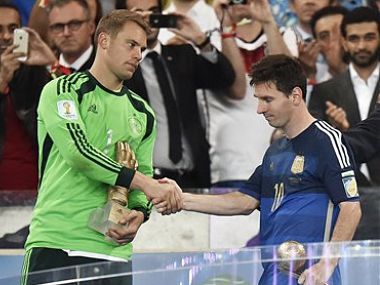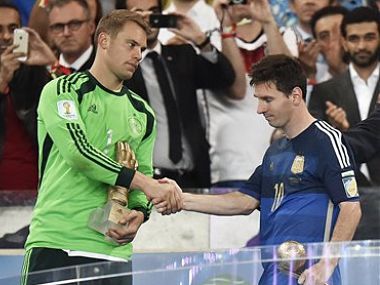At the end of the World Cup final against Germany, Lionel Messi cut a lonely, sad figure. He didn’t smile. He didn’t look at anyone. He didn’t break down like some of his team-mates. He didn’t cry. He didn’t speak a word. He just stood – slightly away – from his team-mates and coach Alejandro Sabella. Dazed. He just stood and looked into the distance – and in his mind, probably relived his missed opportunity in the 47th minute of the match. He curled it – beat the keeper Manuel Neuer but also sent it wide off the far post. It was the kind of goal he has scored many times for Barcelona. But here at the biggest stage – he had failed yet again. The best player in the world has now played in three World Cups and hasn’t won a single. He is also 27. If there is hurt, then perhaps at this moment no one knows it better than Messi. [caption id=“attachment_1617481” align=“alignleft” width=“380”]  Germany’s goalkeeper Manuel Neuer, left, winner of the Golden Glove award for best goalkeeper, shakes hands with Argentina’s Lionel Messi, winner of the Golden Ball award. AP[/caption] This was his chance to do it alone; to lead a rather unspectacular team to the World Cup title; to match Diego Maradona and for most part, he had looked good for the money. Messi’s performance wasn’t blindingly good. Rather, it was sprinkled with moments of just enough genius to carry the team into the next round. His statistics after the final were still among the best in the World Cup: 7 matches, 573 minutes, 4 goals, 1 assist, 23 chances created, 46 dribbles completed. And still there were some… no… maybe many… who thought that the Argentinian genius did not deserve the Golden Ball (the best player of the World Cup award). They thought he wasn’t good enough; they thought others were better; they thought he had missed the bus. A goal in the final would have perhaps sealed the deal and made the award his for the taking. But here’s the deal – he really didn’t seem to care about the award. He wanted a trophy – only it wasn’t the Golden Ball. It was the big one, he couldn’t have that and he was distraught. At the award ceremony, he barely exchanged a word with the trophy presenters or even with Neuer, who received the Golden Glove award. They stood side-by-side. A quick handshake took place (one for the cameras) and then back to his thoughts. He stared at the Golden Ball trophy long and hard – even with Neuer standing right next to him. He was clearly not in the mood for small talk. Within minutes after the defeat, he seemed to have erected an invisible wall around himself. He was there in plain sight, yet, it was like he wasn’t there. His thoughts were working a time travel miracle of their own – one in which he scored the goal and Argentina won in 90 minutes. In the first half, he even vomitted on the field. But that isn’t the first time he has done that. So it didn’t worry Sabella too much. However, after a brilliant first half, his contribution seemed to wane after the missed chance in the 47th minute. The time when he got the ball, he still looked very dangerous and the Germans would immediately have two defenders tracking him. But he wasn’t running as much in the second half. He wasn’t coming back for the ball. Instead, he seemed to be waiting for another chance; for another ball to make amends. But it never came. Perhaps one of his final touches in the game was emblematic of his day. He sent a free kick from 30 yards – late in extra-time– way over the bar. It was so bad that he couldn’t help but give a wry smile. It was not to be his day – he seemed to know it. Now, no one knows what the future holds. But by the time the next World Come comes along, Messi will be almost 31 (his birthday usually falls during the tournament). He probably won’t be the same player. Experience might make him wiser but age will diminish his fearsome acceleration. His passing will still have vision but will it still be as sharp? The thing is – no team is ever sure of making the World Cup final. There are upsets; there are mistakes; there are champions, there are miracles. How will Messi stand the test of time – as he stared into the distance, it seemed like even he was looking for an answer.
If there is hurt, then perhaps at this moment no one knows it better than Messi.
Advertisement
End of Article


)

)
)
)
)
)
)
)
)



